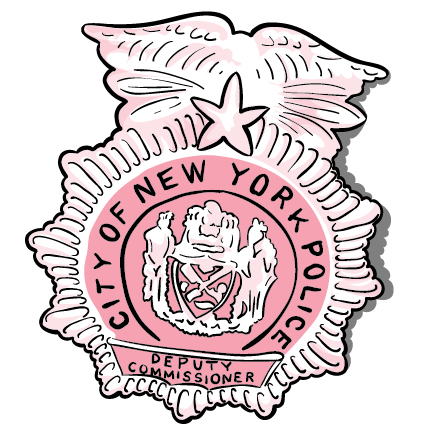Features:
- Produced by the National Badge & Emblem Company, Inc. (now defunct)
- Limited edition
- Fits in your palm
My grandfather William E. Perry Jr. was a career cop. He joined the NYPD in 1956, and during the ’60s, as a young sergeant, he became president of the Guardians Association, a fraternal organization of black officers within the department. In 1978, he was promoted to deputy commissioner for community affairs, and was one of the first black cops to hold the position. His boss, Benjamin Ward, was the first black commissioner of the largest police department in the United States.
After my grandfather was sworn in, he handed out three-quarter-sized replicas of his badge to the four women who’d attended the ceremony with him: his wife, Ina; and his three daughters, Nicole, Michelle, and my mother, Linda. In a photograph from that day, they surround my grandfather, who smiles in his dress uniform. The gold collar pins and the emblem on his hat gleam, and medals of honor crowd his lapel.
It’s common for cops to hand out badge replicas to their families. A badge is a source of pride, and passing down versions from parent to child is a way to build legacy and tradition. Although he never wanted any of his descendants to become cops, my grandfather—who earned a BA, an MA, and attended law school while working his job—did expect us to pursue higher education and to follow his example in terms of our ambition.
And we did. My mother is a college professor who also owns her own business. I’m a novelist. Our professional pursuits remind me of a letter from John Quincy Adams, in which he suggests that he was a soldier so his children could be merchants, so his grandchildren could be poets. And when I think of that letter, I wonder if Adams could even have envisioned a world in which I exist, in which his dream for his own progeny has been realized in a family descended from slaves.
A decade ago, I came across my mother’s replica in a dusty box. I was fascinated. At the center of the gold, eagle-topped badge is the blue seal of New York City. The city flag also bears this seal, but how many of even the most seasoned New Yorkers can conjure this image of a Dutch colonist and a Lenape man holding up a shield? On the shield are the arms of a windmill, two barrels of flour, and two beavers: symbols of prosperity.
When I told my mother I was writing about the replica, she said not to suggest that my grandfather had handed...
You have reached your article limit
Sign up for a digital subscription and continue reading all new issues, plus our entire archives, for just $1.50/month.
Already a subscriber? Sign in





